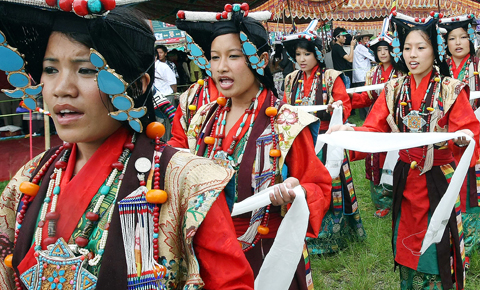The Dalai Lama turned 75 yesterday, a milestone marked by celebrations in his hometown-in-exile but also reflection on his successor and the deadlock with China on the future of Tibet.
Under relentless rain, the Tibetan spiritual leader addressed a packed crowd of 5,000 followers at his temple in McLeod Ganj, a hill station in the Indian Himalayas where he has lived since fleeing Tibet in 1959.
Smiling and in apparently fine health, the Buddhist spiritual leader sat at the center of a stage in front of thousands of school children, fellow Tibetans in exile and foreign tourists.

PHOTO: AFP
Staring out at a banner depicting him at various stages over the last three-quarters of a century, he declared: “When I see those pictures and see the development, I know my life has not been wasted.”
In a speech delivered in his native language, he regretted that Tibetans in Tibet would not be allowed to mark his birthday due to oppression from the Chinese authorities, which vilify him as a separatist.
Stressing that studying Buddhism enabled him to be happy in adversity, he urged the crowd to show compassion in their own lives and finished with some practical advice.
“Be careful of the weather. Don’t get ill,” he said, as many shivered in the downpour.
At an age when most others are putting their feet up, the Dalai Lama keeps up a globe-trotting schedule that would tire someone half his age, traveling to countries willing to defy Chinese pressure not to grant him a visa.
In an average year, he is away from home for about half the time and in the past 12 months has visited France, Switzerland, the Czech Republic, Germany, Poland, the US (twice), Taiwan and most recently Japan.
As the years go by, however, thoughts are inevitably turning to the issue of succession.
The Dalai Lama has been in hospital twice in recent times — for a pinched nerve in February last year and for surgery to remove stones from his gall bladder in October 2008.
While decades of on-off negotiations with Beijing have seen no tangible progress, the Nobel peace laureate has been extremely successful in keeping the Tibet issue alive with a campaign that continues to attract global sympathy.
There is concern, however, that his death might prove a blow to the cohesion and momentum of the Tibetan movement that has relied for so long on his leadership and the reverence in which he is held by sympathizers.
“It will be a completely different ball game when His Holiness is no longer with us,” said Tsewang Rigzin, the president of the Tibetan Youth Congress.
“We need to be prepared for that day when it comes and that means having a strong government in exile and a good education system for the young generation,” he said.
The prime minister of the government-in-exile, Samdhong Rinpoche, urged the Dalai Lama to slow down to preserve his energy as his endeavors “are certainly taking a great toll.”
China has already indicated that it will take a hard line on the selection of a successor, with Qiangba Puncog, Tibet’s former governor, insisting in March that final approval lies with Beijing.
Meanwhile, dozens of Tibetan exiles on their way to take part in a celebration for the Dalai Lama’s birthday were detained by police yesterday in the Nepalese capital.
Police stopped vehicles to check for the exiles, and a reporter saw at least 22 Tibetans detained at the Anamnagar police station before authorities told reporters to leave the premises.
Katmandu Police Chief Ramesh Kharel said the Tibetans were taken for questioning and would be soon released.
Laxmi Prasad Dhakal, Katmandu district administration chief, said the government has banned and will not tolerate protests against what it calls all friendly nations, including China.

Nauru has started selling passports to fund climate action, but is so far struggling to attract new citizens to the low-lying, largely barren island in the Pacific Ocean. Nauru, one of the world’s smallest nations, has a novel plan to fund its fight against climate change by selling so-called “Golden Passports.” Selling for US$105,000 each, Nauru plans to drum up more than US$5 million in the first year of the “climate resilience citizenship” program. Almost six months after the scheme opened in February, Nauru has so far approved just six applications — covering two families and four individuals. Despite the slow start —

North Korean troops have started removing propaganda loudspeakers used to blare unsettling noises along the border, South Korea’s military said on Saturday, days after Seoul’s new administration dismantled ones on its side of the frontier. The two countries had already halted propaganda broadcasts along the demilitarized zone, Seoul’s military said in June after the election of South Korean President Lee Jae-myung, who is seeking to ease tensions with Pyongyang. The South Korean Ministry of National Defense on Monday last week said it had begun removing loudspeakers from its side of the border as “a practical measure aimed at helping ease

DEADLY TASTE TEST: Erin Patterson tried to kill her estranged husband three times, police said in one of the major claims not heard during her initial trial Australia’s recently convicted mushroom murderer also tried to poison her husband with bolognese pasta and chicken korma curry, according to testimony aired yesterday after a suppression order lapsed. Home cook Erin Patterson was found guilty last month of murdering her husband’s parents and elderly aunt in 2023, lacing their beef Wellington lunch with lethal death cap mushrooms. A series of potentially damning allegations about Patterson’s behavior in the lead-up to the meal were withheld from the jury to give the mother-of-two a fair trial. Supreme Court Justice Christopher Beale yesterday rejected an application to keep these allegations secret. Patterson tried to kill her

CORRUPTION PROBE: ‘I apologize for causing concern to the people, even though I am someone insignificant,’ Kim Keon-hee said ahead of questioning by prosecutors The wife of South Korea’s ousted former president Yoon Suk-yeol yesterday was questioned by a special prosecutor as investigators expanded a probe into suspicions of stock manipulation, bribery and interference in political party nominations. The investigation into Kim Keon-hee is one of three separate special prosecutor probes launched by the government targeting the presidency of Yoon, who was removed from office in April and rearrested last month over his brief imposition of martial law on Dec. 3 last year. The incident came during a seemingly routine standoff with the opposition, who he described as “anti-state” forces abusing their legislative majority to obstruct